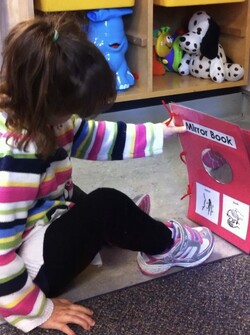Experience Books
An experience book is a tool that is created by or with a student to support communication about an event or topic that is meaningful to them. Experience books come in many forms and are personalized be accessible to an individual student, considering their vision, hearing, mobility, conceptual understanding, and preferences.
Rationale for Using Experience Books with Students who are Emerging Communicators

By Linda Mamer and Carolyn Monaco
A book about oneself is very motivating for an individual. An experience book will elicit more language than most anything else.
An experience book provides the Intervenor with an opportunity to introduce, teach, and review concepts and vocabulary related to a planned activity.
The experience book provides the Intervenor opportunities to reinforce language experiences that do not occur frequently. For example, if a time when an individual was hurt or hospitalized was depicted in an experience book, you would have a tool available to reinforce those particular concepts without re-living the actual experience.
Experience books are one of the few ways we have of re-living past events with individuals with deafblindness - this can be especially important for person with unique language needs.
The experience book allows the Intervenor to reinforce important language in a quiet, relaxed atmosphere with the best possibility for sensory input. This reinforcement is often difficult during the actual event. For example, there are only a few ways to reinforce bath or swim time language with the hearing aids on - the experience book is one of them.
The experience book provides a source of individualized, printed material appropriate to the visual, tactile, conceptual and communication needs and abilities of the individual.
Types of Experience Books
Experience Books can be roughly divided into four categories that have different purposes.
- Trip Books are prepared with the learner before going out into the community or travels. They help the student anticipate the steps involved in the outing. Trip Books are one of the Intervenor’s strategies for Anticipation.
- Memory Books are made after an activity has finished. They help the student remember the experience, share it with others, and learn from it.
- Concept Books are created to help a student develop a concept. They may help a student understand an activity or specific concepts such as colours, family, shoes, parts of the body, etc.
- Procedural Books are created with a student to help develop an understanding of the steps needed to complete a task or activity.
Read more about the four types of experience books